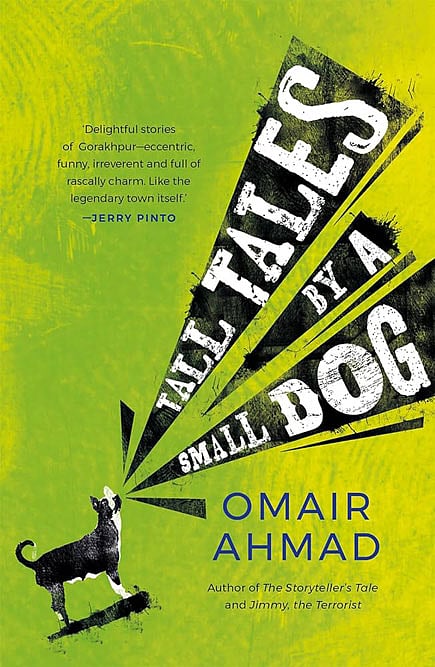Dog Days

“This is Gorakhpur, and our history is like our soil, all mixed up in the past and present, nothing quite pure, legend, hearsay and tall tales all running into each other,” the canine narrator of Omair Ahmad’s new book Tall Tales by A Small Dog, says. The city of Gorakhpur plays the muse for a whimsical, perky satire about the nature of becoming and belonging. Divided into six stories that travel across timelines and socio-political concerns, Ahmad’s book essentially feels like a collection of folktales, a restorative view of history that simultaneously trains its eye at the cultural ferment of the present. This collection of short stories is as impossible to predetermine as it is to ignore. It’s a bewitching, mildly hilarious read, but also a victim of one too many narrative cogwheels.
Kallu, a dog from the streets of Gorakhpur, acts as the narrator of the book. “All dogs are storytellers, and all storytellers are liars,” Ahmad both warns and teases the reader in his introductory note. From a notorious gangster who earns his reputation for using the narrator as a weaponised object, to a man who spends a lifetime trying to overcome an unfortunate nickname—Haggu—Ahmad’s stories are firmly etched in the language of the streets, the unquantifiable, randomness of it all. The austere and the audacious often overlap in this collection that moulds legends (the kind that a place is known by) to make a point about facts.
Imran Khan: Pakistan’s Prisoner
27 Feb 2026 - Vol 04 | Issue 60
The descent and despair of Imran Khan
Ahmad’s ability—also evident in Man Asian Prize shortlisted Jimmy the Terrorist—to re-contextualise history through an unconventional lens is on display here. “India’s struggle for freedom was also a struggle against gas and constipation,” a foreign tourist deduces, in a self-serious tone. The stories travel across time, from the uprising of 1857 to the present day. Along the way, Ahmad also hands out trivia, telling us that Munshi Premchand came and studied in the town before leaving and that it was here that one of the most unique episodes of the 1857 war for independence, with little historical record, played out. It’s the kind of historical annotation that can be conjured up only by a writer who is well-versed with the feel and smell of the soil.
While a story like ‘The Buddha’s Smile’ does justice to folklore, Ahmad also finds time to address the present. From prescient nods to political figures, there is even time, though not necessarily place, for venerating Shah Rukh Khan. In ‘Haggu and the Magic Bullet’, the story of a goon’s rise from the ignominy of publically shitting in his pants during an altercation to commanding power through violence, the narrator considers Khan as a “complicated star”. “Grown tough-talking men were crazy about him,” Kallu argues at one point. Handing the narrative baton to a dog, allows the book to attest to its sprawling stories the snippy wit of commentary but what it also does is look sideways without a sense of direction. The folksiness here is brimming with ideas, and while some of them carry the whimsicality of street-bred rumours, not all of them rise above the defiant but also short-lived life of a misheard anecdote.
Ahmad has always written prose that effortlessly merges chaste English with a more native lingua franca, and here his ability to wear that street-smart candour through waves of elite prose, shines through. In ‘The Dog Thrower of Chhote Qazipur’, the story of Bilal’s rise on the streets of a communally hostile Gorakhpur, for example, the canine narrator is often referred to as “Kallu aashiq”, “Kallu Maharaj” and the dialogue is prefixed with “Chalo” “Haiye”, “Oye” and other possibly untranslatable Hindi colloquialisms. It helps that a dog’s unsophisticated, matter-of-fact gaze, sets up a reading sprint through eccentric tales that have more in common with tittle-tattle that our streets echo with day and night, than comparatively polished recorded histories. It is precisely what towns, unexplored, and understudied would yield if poked with curiosity and verve, through a liberating form of curiosity and fabulist ideas. Ideas that Ahmad himself describes “like our messy, twisty galis, like the complicated webs of cable and wire that hum and spark and sizzle above many.”

